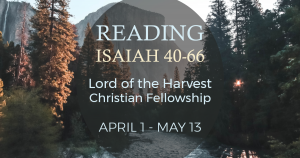
These are the notes for Day 1 of Lord of the Harvest’s Isaiah Reading Plan.
Isaiah 40-66 Reading Checklist (download PDF)
Introduction to Isaiah 40-66 Notes (download PDF)
Introduction to Isaiah 40-66
Pastor Mike Osminski
Part 1
Chapter 40 is the opening summary of the prophecies that run from chapters 40-55, known in some circles as “Second Isaiah.” I will be providing teaching that is assisted by the insight in Klaus Baltzer’s commentary on Deutero-Isaiah.
The important themes covered in chapter 40 help to prepare us for the prophecies in these chapters. Announced are the following: the LORD’s sovereignty over all the world, the chosen status and redemption of Jacob/Israel, the renewal of Zion/Jerusalem, the dispute with and warfare against the gods of the nations and their idolatrous images, and the revelation of the Divine word. These issues had been dealt with by other prophets but are summarized powerfully by Isaiah.
This prophecy (like the book of Revelation) stretches from Heaven to earth, from creation to the return from the exile in Babylon, through the desert and back to Jerusalem, from the time of ancient Israel to the time of the Messiah (and unto our days and the final establishment of the Kingdom of God/Heaven). The early church saw the prophecies of Isaiah, particularly these 27 chapters, as the “Fifth Gospel.” It has much in common with the eschatological plan revealed in the Psalms and the book of Revelation.
Part 2
Isaiah 40 is considered a prologue or introduction to chapters 40-55:
Verses 1-2 The LORD our God speaks
Verses 3-11 The prophetic voice/prophet speaks
Verses 12-17 The heavenly council speaks
Verses 18-20 The idolaters enter
Verses 21-24 The prophetic voice or perhaps the heavenly council speaks
Verses 25-26 The LORD God speaks
Verses 27-31 The prophet directly addresses Israel
There is a pattern that emerges here. The Lord Himself must speak before any prophet or heavenly being speaks. Only then can the prophet speak a word that is the word of the Lord (John 5:19-20,30-31).
A true prophet is part of the heavenly council, so the true prophet is always part of the heavenly deliberations and thus possesses the heavenly perspective. The major obstacle to the development of an authentic prophetic perspective is idolatry from which proceeds false prophecy (Zechariah 13:2). The LORD speaks a second time and then the prophet addresses the people of God.
Part 3
The pattern seen in Isaiah 40-55 (and also in chapters 56-66), especially as outlined in chapter 40, is also demonstrated in the book of Revelation (though not necessarily in the same order as illustrated in Isaiah 40).
The Lord is revealed and speaks first (Rev 1), John addresses the people of God prophetically (Rev 2-3), and John is transported to heaven and into the heavenly council (represented in Rev 4-5 by the living creatures and the 24 elders). The living creatures represent the supernatural dimension of the heavenly council while the 24 elders represent the familial dimension. The idolaters are represented in Rev 13 & 17-18 by the beast (political dimension), the false prophet (religious dimension), and the harlot (socio-economic dimension).
Conclusion
A key figure who has yet to be introduced into the prophetic drama unfolding in chapters 40-55 is the Servant of the Lord. The entire prophetic fulfillment of the LORD’s eschatological plan, the establishment of God’s kingdom purposes in human history, revolves around the coming and work of His Servant. His Servant first appears in chapter 42.
This chapter is the first of four “Servant Songs” or “Servant Texts” in chapters 40-55. Their list is as follows:
Song/Text 1 Isa 42:1-9
Song/Text 2 Isa 48:16-49:12
Song/Text 3 Isa 50:2-51:16
Song/Text 4 Isa 52:13-53:12
The Servant of the Lord in Isaiah is none other than the Lamb who is the Lion in the book of Revelation.
